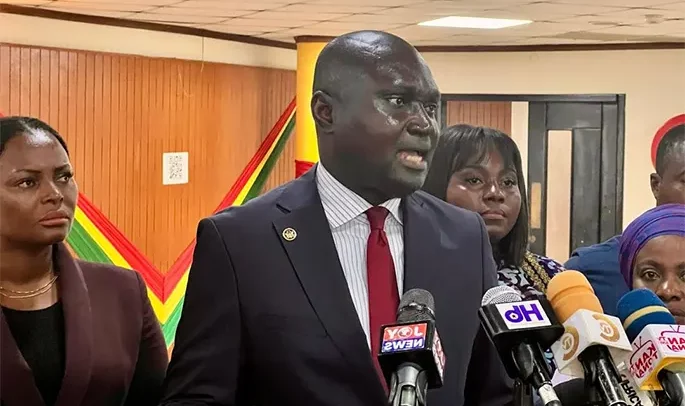Charles Asuako Owiredu, New Patriotic Party (NPP) MP for Abirem
The Minority in Parliament has slammed the decision to shut down a number of radio stations across the country, describing it as arbitrary and politically motivated.
Charles Asuako Owiredu, New Patriotic Party (NPP) MP for Abirem, argued that the move threatens media freedom and undermines the constitutional right to free speech.
Commenting on the issue after a statement delivered by the Minister of Communications and Digital Technology, Sam Nartey George, he questioned the consistency and fairness of the process, suggesting that the closures targeted stations affiliated with opposition voices.
“The media is the fourth estate of the realm, and it plays a critical role in entrenching democracy,” Mr. Owiredu said.
“It appears we are about to monetise free speech in Ghana. Many of these stations, especially community radio stations, serve as the only means of communication in our constituencies. Banning them would cut off essential channels of information,” he added.
The NPP MP criticised the Communications Minister for an abrupt policy shift, pointing out that the Minister initially announced the closures but later softened his stance, offering a grace period for affected stations to regularise their licenses.
“We believe this decision is arbitrary. The initial directive could have been avoided with proper engagement with the radio stations involved. Now, suddenly, clemency is being granted. What has changed?” he asked.
Mr. Owiredu further alleged that the decision was politically driven, claiming that stations owned by political opponents were deliberately targeted.
However, not all MPs agreed with his position.
Philip Fiifi Buckman, NDC MP for Kwesimintsim, defended the closures, praising the Minister and the President for enforcing the law and sanitising the media space.
He stressed the importance of adhering to regulations to maintain order and prevent anarchy.
“We cannot allow impudence. We cannot allow people to do whatever they like in the name of media freedom. Leadership must show tenacity and ensure that our airwaves are properly regulated,” Mr. Buckman said, adding his full support for the Minister’s actions.
Other MPs, including Matthew Nyindam of Kpandai, called for a more balanced approach. Mr. Nyindam acknowledged the need for regulation but questioned the timeline given to radio stations to regularize their operations.
“Thirty days is not enough for some of these community stations to renew their licenses. We must reconsider how the laws are applied, especially since these are not profit-making commercial stations,” he noted.
The Minority Leader, Alexander Afenyo-Markin, also weighed in, cautioning the National Communications Authority (NCA) and the Communications Ministry to act within the confines of the Constitution.
“Democracy must be guided for its own good. Regulatory authorities must exercise their powers within the limits of the law. The sudden U-turn by the Presidency, offering clemency, suggests that the initial move may have been ill-considered and possibly unconstitutional,” he argued.
He emphasized that past abuses should not be repeated, urging the government to avoid the appearance of political witch-hunting and instead foster dialogue with affected media houses.
“You cannot break it and pretend to be fixing it. We must protect press freedom, not impede it. The NCA and the Ministry must deepen engagement and avoid harsh punitive actions that could damage our democracy,” Mr. Afenyo-Markin said.
The debate came after the Minister, Sam George, announced the NCA’s closure of over 60 radio stations, citing license infractions.
Following public backlash, the Presidency later intervened, offering a grace period for affected stations to comply with regulatory requirements, the Minority asserted, insisting that the closures remain unjustified.
By Ernest Kofi Adu, Parliament House


